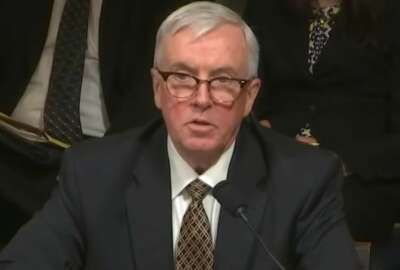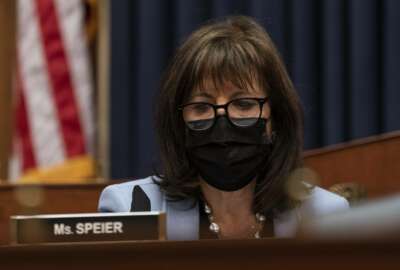
GAO flags longstanding quality and organizational concerns with DHS OIG
The Department of Homeland Security's inspector general is working with the National Academy of Public Administration on a five-year strategic plan and a path f...
Congress is keeping a close eye on the Department of Homeland Security’s Office of Inspector General after an initial review of its operations over the last five years uncovered longstanding organizational challenges and quality concerns.
The Government Accountability Office presented to Congress a set of preliminary findings and recommendations based on its review of the DHS OIG. Audits are taking longer, and the DHS OIG has been operating without key auditing policies and procedures, including a strategic plan, for the last four out of six years.
GAO also raised concerns with the quality of work at DHS OIG, in part because the office lacked a clear quality assurance program. These concerns ultimately tarnish the IG’s credibility in the eyes of its department, GAO said.
The DHS OIG retracted 13 reports between 2017 and 2018 because an internal review questioned whether they met government auditing standards.
And in 2018, the Council of the Inspectors General on Integrity and Efficiency (CIGIE) organized a peer review of the DHS OIG and gave the office a “pass with deficiency” rating for its audit work.
“In the auditing world, this is not the passing grade that you want,” Chris Currie, GAO’s director of homeland security and justice issues, told the House Homeland Security Committee at a Wednesday hearing. “This means that the peer reviewers had concerns about the quality of the work and that some work did not meet quality standards.”
Audits and other work have also taken longer in recent years. According to GAO, eight projects took more than 18 months to complete in 2017.
But in 2020, 35 projects took longer than 18 months to complete. The DHS OIG finished seven out 67 audits in less than a year.
“Reports sometimes lack the most current information from the agency and policies once they’re finally issued,” Currie said. “This in turn makes the findings and recommendations less useful to DHS and you, the Congress.”
High-profile disputes with senior leaders within the DHS OIG haven’t helped. Joseph Cuffari, the current DHS inspector general, hired an external law firm to review misconduct allegations involving three OIG executives. The executives engaged in conduct that was detrimental to the DHS OIG and its mission, the firm found.
GAO said these are preliminary findings from an ongoing review of the DHS OIG. The review covers a five-year period, from 2015 through 2020. Cuffari, the current IG, was the leader for one of those years. He’s the fourth acting or permanent IG to serve at the department during that five-year period.
“To be clear, these challenges are longstanding and span multiple leaders and multiple administrations,” Currie said. “As a result, blame rests with no one person but on years of inconsistent and poor management discipline and practices in our view.”
Currie said the GAO review wasn’t intended to dwell on the past but to expose the root causes behind DHS OIG’s challenges.
“I was very surprised by the amount of recommendations and findings in here; 21 is an unbelievable number for something like this,” said John Katko (R-N.Y.), ranking member of the House Homeland Security Committee.
Cuffari said the National Academy of Public Administration is working with the DHS OIG on a five-year strategic plan for the agency, which is expected near the end of the summer.
“All of these things need to be put together into one transformational plan,” Currie said. “It needs to have a dedicated management and leadership team that’s responsible for it. There needs to be, for example, a communication plan to all employees about what the vision is, what the timelines are, what the metrics are and how do we know when we’ve reached success. There needs to be constant communication with Congress and others. There’s a very specific process for doing this, and it’s not impossible. It’s been done before.”
Cuffari said he will exercise a one-year option on the NAPA contract so the academy can work with his office to implement GAO’s recommendations.
“You have my commitment that I’m going to continue to work with my counterparts at GAO to continue to improve our office here,” Cuffari said.
Beyond its work with NAPA, Cuffari said he’s realigning the office. He created two organizations on integrity and innovation and separated his human resources group from the counsel’s office. Cuffari said these organizational changes bring DHS in line with other inspector general offices at other large departments, including the Pentagon and the Department of Health and Human Services.
It’s too soon to tell whether these organizational changes will make a difference, Currie said. He encouraged the OIG to establish specific policies on human capital and auditing procedures, which could improve morale.
“There was a question about whether certain policies were outdated, were in effect or were not in effect,” Currie said. “This made people call into question certain decisions they were observing from top-level staff that seemed somewhat arbitrary. The problem is when you have no clear policies and procedures and it’s not transparent, it’s very difficult to be consistent in your application with those policies and procedures.”
Cuffari said morale among DHS OIG staff has improved, and the latest results from the 2020 Federal Employee Viewpoint Survey had reached a five-year high within his organization.
But without a broad strategic plan or specific policies in place, Currie said it may leave OIG employees and the public to “fill in the gaps” about the inspector general’s priorities and why it takes on certain projects and not others.
“We have very strict, clear policies and procedures, not just so our own staff understand how to do the work and know what to expect, but so everyone outside externally understands it, you in Congress and also the agency that gets audited,” Currie said of his organization. “This creates a predictable process. It creates a trusted process with integrity and helps to avoid a lot of the miscommunications and problems that can come up.”
The Project on Government Oversight recently questioned Cuffari’s decision not to move forward with two proposed audits from career staff, one on the spread of COVID-19 among Secret Service agents and another on the service’s interactions with protesters in Lafayette Square in Washington, D.C., last summer.
When asked about these particular projects, Cuffari stood by his decision. He said other government inspectors general dedicated a portion of their reviews on the Lafayette Square protests to the Secret Service, and limited resources at DHS OIG prevented him from opening further investigations.
Multiple committee members, including Katko, said they wanted to host additional hearings so they could measure progress with the OIG.
“It sounds like very much the early stages of a work in progress,” said Rep. Lou Correa (D-Calif.).
Committee Chairman Bennie Thompson (D-Miss.) agreed. GAO will issue a final report on its findings in the coming months.
Copyright © 2024 Federal News Network. All rights reserved. This website is not intended for users located within the European Economic Area.
Nicole Ogrysko is a reporter for Federal News Network focusing on the federal workforce and federal pay and benefits.
Follow @nogryskoWFED




